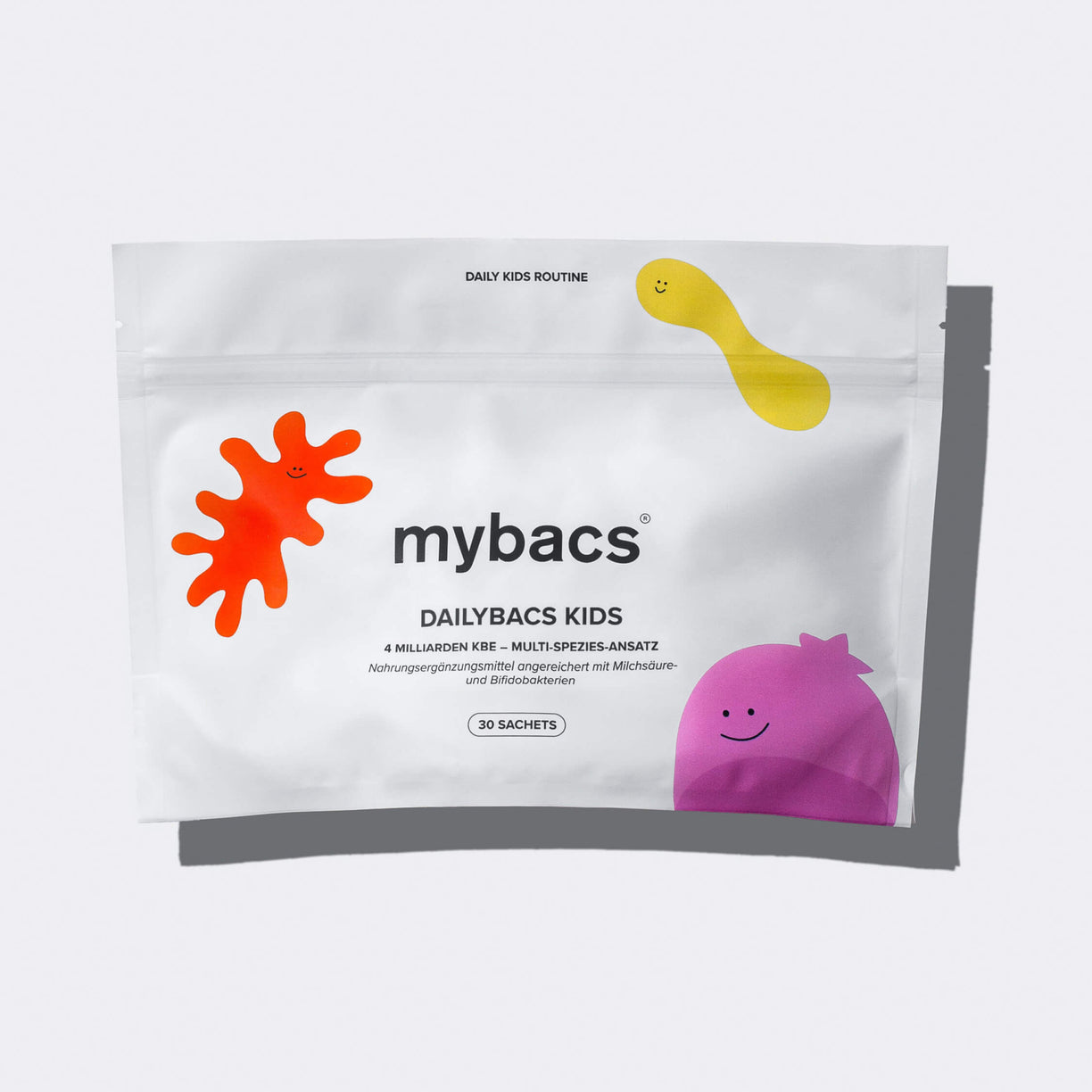
Probióticos especialmente desarrollados para mejorar la digestión y defensas de los niños
Supports the immune system²
Delicious Berry flavor
Subscribe & Save
Onetimer
Who is it suitable for?
Dailybacs® Kids is a specially developed food supplement for children and adolescents aged 3 to 17 years. The practical powder form was specially developed for child-friendly consumption - simple and uncomplicated in just one sachet per day. The formula contains carefully selected live bacterial strains.

Wichtige Hinweise: Die angegebene Verzehrempfehlung darf nicht überschritten werden. Der Konsum ist geeignet für Diabetiker und Milchallergiker. Nahrungsergänzungsmittel sind kein Ersatz für eine ausgewogene und abwechslungsreiche Ernährung und eine gesunde Lebensweise. Nicht geeignet für Schwangere oder Stillende, sowie Menschen mit einem geschwächten Immunsystem. Für Kinder unerreichbar aufbewahren. Trocken und bei Raumtemperatur lagern. Gluten-, hefe- und laktosefrei.
Dosage and Intake
One sachet daily Take Dailybacs® Kids before breakfast. Taking Dailybacs® Kids is child's play: simply open the sachet and tip the contents directly into your mouth. Alternatively, the contents can also be stirred into yoghurt or water.

The preparation can also be taken at another time without any problem.
nutritional information
Portion size: 1 sobre
Packaging: 30 sobres
*NRV=Nutrient Reference Value according to LMIV (CH: LIV)
Indicaciones importantes: La cantidad diaria recomendada indicada no debe superarse. Los complementos alimenticios no sustituyen una dieta equilibrada y variada ni un estilo de vida saludable. No apto para mujeres embarazadas o en período de lactancia, ni para personas con el sistema inmunitario debilitado. Mantener fuera del alcance de los niños pequeños. Conservar en un lugar seco y a temperatura ambiente.
Benefit from the mybacs® subscription benefits:
To show you how much we value you as a subscriber, you will receive a free gift with your monthly subscription delivery for the first 6 months.

Get a free gift , exclusively for subscription customers.

Stay tuned & save with your personal 15% discount code on your next delivery.

Expand your routine - test this ''Product of the month free of charge.

Your routine to go - our sustainable travel jar for on the go.

Discover delicious fiber - Daily Greens sample pack.







Rutina diaria para niños
INTESTINO
Con una ingesta regular se añade al microbioma intestinal una gran cantidad de cepas bacterianas activas: con Dailybacs® Kids, 4 mil millones de UFC por stick directo procedentes de 10 bacterias vivas de ácido láctico y bifidobacterias cuidadosamente seleccionadas. El aliado para establecer una rutina diaria para tu hijo.
SISTEMA INMUNITARIO Y CRECIMIENTO ÓSEO¹˒²
Más del 70% de las células inmunitarias se encuentran en el intestino. Dailybacs® Kids contiene vitamina C y zinc, que apoyan la función del sistema inmunitario.³˒⁵
MICROENCAPSULACIÓN INNOVADORA
Las bacterias gozan de una protección y estabilidad especiales gracias a la más moderna tecnología de microencapsulación. Gracias a ello, sobreviven mejor al paso por el estómago y permanecen estables, lo que equivale a una dosis cinco veces mayor:
→ 4 mil millones de UFC = como 20 mil millones de UFC.
ESPECIALMENTE PARA NIÑOS
Dailybacs® Kids: adecuado para niños y práctico. Los ingredientes de nuestros sticks directos con delicioso sabor a frutos del bosque han sido desarrollados especialmente para el consumo infantil. Ideal para casa y para llevar.
The intestinal microbiome in children
The intestinal flora plays a central role in every person's digestive system. Our microbiome is not complete from birth, but develops over time.
birth
At birth, your newborn is confronted for the first time with a variety of bacteria that settle in the intestines. During a natural birth, these come from the maternal vaginal microbiome (e.g. Escherichia coli, Staphylococcus and Streptococcus, as well as Bacteroides and Bifidobacterium).
In contrast, during a cesarean birth, the first bacteria come primarily through skin contact with family members and from the environment, which leads to a different “starting microbiome”.
infants
During breastfeeding, the baby absorbs a variety of different bacteria through breast milk, including lactic acid bacteria. These are part of the infant's natural microbial environment.
The composition of breast milk differs from alternative bottle formula, which is, however, tailored to the specific needs of infants.
toddlers
With the introduction of pureed meals, new species of bacteria enter the intestine, and during the first two years of life the composition of the child's microbiome changes dynamically.
A balanced and age-appropriate diet with a variety of foods, including whole grain products, fruits and vegetables, contributes to a varied nutrient intake.
children and adults
In older children and adults, the microbiome changes less dynamically, but remains influenced by various factors such as diet, lifestyle and environmental influences. Each phase of life brings different changes in the microbiome.
The composition of our Dailybacs® Kids takes into account the typical eating habits of children and adolescents. From the age of 17, we recommend switching to Dailybacs® Women/Men, which are tailored to the general diet of adults.
Dailybacs® Kids at a glance!
How do Dailybacs® Kids work?
How is the safety and quality of Dailybacs® Kids ensured?
At what age can children be given Dailybacs® Kids?
I saw that the product is not recommended for immunocompromised individuals – why?
Why can I only order a pack as part of a subscription and not as a one-time purchase?
¿Y si no me convence?


Would you like to know more?
The mybacs® Journal offers scientific information, tips and recommendations on the topics of intestinal microbiome and well-being from doctor & co-founder Dr. Adrian Weingart.
Would you like to know more?
The mybacs® Journal offers scientific information, tips and recommendations on the topics of intestinal microbiome and well-being from doctor & co-founder Dr. Adrian Weingart.

































